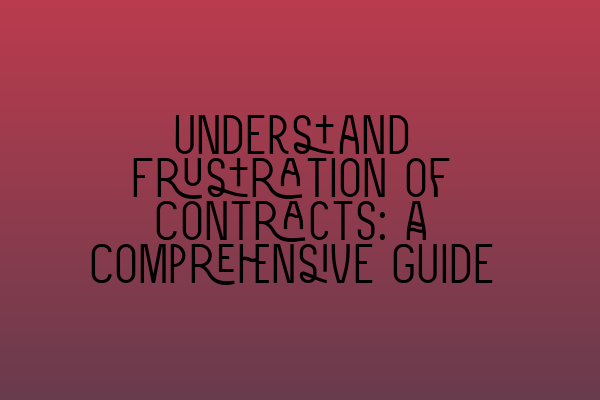Understand Frustration of Contracts: A Comprehensive Guide
Contracts play a vital role in business transactions and legal agreements. However, there may be instances when a contract becomes impossible to perform due to unforeseen circumstances or events outside the control of the parties involved. In such cases, frustration of contracts comes into play.
In this comprehensive guide, we will explore the concept of frustration of contracts, its legal implications, and how it can affect different aspects of contract law. Whether you are a contract law student preparing for the SQE exam or a legal professional looking to enhance your understanding, this guide will provide you with the knowledge you need.
1. What is Frustration of Contracts?
Frustration of contracts refers to a situation in which an unforeseen event occurs after the formation of a contract, making it impossible for the parties to fulfill their obligations. This can include events such as natural disasters, government regulations, or the death or incapacity of one of the parties.
2. Legal Implications of Frustration of Contracts
When a contract becomes frustrated, it is no longer binding on the parties. The doctrine of frustration aims to provide fairness and justice in situations where it would be impractical or unfair to hold the parties accountable for their inability to perform.
3. Elements of Frustration of Contracts
To establish frustration of contracts, certain elements must be present:
a. Unforeseen Event: The event causing frustration must be unforeseen and beyond the control of the parties.
b. Object of the Contract: The frustrating event must make the contractual obligations impossible to perform, not merely more difficult or economically unfavorable.
c. No Fault of the Parties: The frustrating event must not be the result of the parties’ fault or negligence.
4. Effects of Frustration of Contracts
When a contract becomes frustrated, it is deemed to be discharged, and the parties are released from their obligations. This means that neither party can sue for breach of contract, and any payments made before frustration can be recovered.
5. Cases Illustrating Frustration of Contracts
To gain a better understanding of frustration of contracts, let’s explore a few notable cases that have shaped this area of contract law:
a. Taylor v. Caldwell: In this landmark case, a contract for the rental of a music hall was frustrated due to the hall’s destruction by fire. The court held that the contract was frustrated and discharged, as the event was unforeseen and made performance of the contract impossible.
b. Davis Contractors Ltd v. Fareham Urban District Council: This case involved a construction contract that became impossible to fulfill due to unexpected subsurface conditions. The court ruled that frustration had occurred, releasing the contractor from its obligations.
6. Considerations for Drafting Frustration Clauses
To mitigate the risk of frustration, parties can include frustration clauses in their contracts. These clauses allow for the consequences of frustration to be addressed in advance, providing clarity and protection.
7. Seek Legal Advice
If you are facing a situation where a contract has become frustrated or need assistance in drafting frustration clauses, it is recommended to seek legal advice. A solicitor specializing in contract law can guide you through the complexities of frustration and help protect your interests.
In conclusion, frustration of contracts is an essential concept in contract law. Understanding its implications and how it can affect contractual obligations is crucial for legal professionals and aspiring contract law students preparing for the SQE exam. By familiarizing yourself with the elements of frustration, the effects it has on contracts, and relevant case law, you can navigate the complexities of contract law more confidently.
Related Articles:
– SQE Sample Papers: Practice for Exam Success
– Adjusting Your SQE Strategy Based on Mock Performance
– Peer Discussions Post-Mock: Learning from Collaboration and Feedback
– Interactive Mock Tests for a Realistic SQE Experience
– Sharpen Your Skills with SQE Practice Questions
